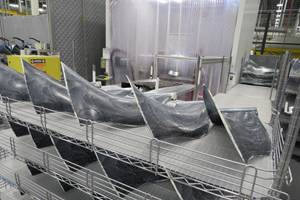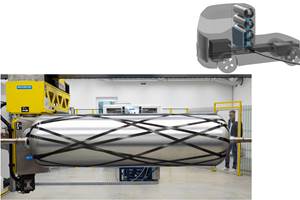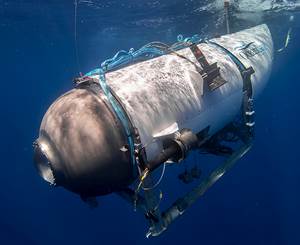Re:Build launches line of thermoplastic composite slitting, ply stacking equipment
TPX line of tape slitters and off-axis, continuous roll ply stacking equipment is customizable to bring thermoplastics part production up to scale.
Re:Build Manufacturing (Framingham, Mass., U.S.) announces TPX, a new line of slitting and off-axis, continuous roll ply stacking equipment for thermoplastic composite material and component manufacturers. Re:Build’s automation team collaborated with Re:Build Oribi, which produces thermoplastic components, to design and build customizable composite converting equipment to improve the production efficiency of continuous fiber-reinforced thermoplastic (CFRTP) parts. Through this collaboration, Re:Build has developed and piloted the equipment internally, and now has optimized it for the broader market, equipping customers to bring thermoplastic composite parts to market faster at a reduced cost.
The TPX product family enables manufacturers to slit tape to specified widths and to pre-stack tape into a specified format (width, thickness, roll length, ply shape) to produce tailored, offset laminates with varying ply orientations in a continuous roll. Designed to meet tolerance and volume demands for a range of industries — including aerospace, automotive, energy, and sports and recreation — the TPX portfolio can be customized by Re:Build’s automation team to meet any specific application requirements.
The adoption of CFRTP composite materials continues to rise. This is due to the material’s ability to meet the mechanical and structural performance requirements of a range of applications, be produced at high production volumes and be recycled at end of life.
“There is a growing demand for thermoplastic composite materials for applications where minimizing weight, avoiding corrosion, and achieving excellent strength and durability are critical. While it is exciting that the market is finally realizing the benefits of thermoplastics, the knowledge and infrastructure to manufacture these components at scale has not caught up yet,” says Jon Huang, Re:Build Manufacturing’s director of thermoplastic technology.
As the market continues to grow, the demand for material converters also grows, which can result in longer lead times, fewer material format options and rising costs for the customer. Re:Build’s TPX line of processing equipment aims to address these issues and improve the industry’s capability to produce thermoplastic components.
The two products offered in the TPX product line include:
- Tape slitter: The slitter provides a compact alternative to standard slitting equipment, offering a footprint 65″ wide × 138″ long × 95″ tall and operating at production rates up to 200 ft/min.
- Continuous roll ply stacker: The standard ply stacker offers ply orientation options of 0°, 30°, 45°, 60° and 70° (all +/-) and uses ultrasonic tacking for ply-to-ply adhesion. Users can create and build custom ply stacks to achieve the desired material performance while accounting for batch size, timeline, material type and part purpose.
Both systems are built to process commercially available thermoplastic tapes (6-24" wide), but can be customized to meet nearly any requirement, according to the company. TPX equipment also works with a wide range of thermoplastic polymers — from commodity-grade PE up to higher temperature polymers, such as PEKK and PEEK — and any fiber type (continuous glass, carbon, aramid). While the slitter and stacker are independent machines, they can also be used in tandem to further reduce production time, labor requirements and development costs.
“TPX equipment at Re:Build Oribi enables us to control nearly every aspect of our material input cost,” adds Mike Gordon, operations manager at Re:Build Oribi. “This also has enabled us to allocate our most valuable resource — labor — to solve other, higher value-added challenges for us as we scale up our production volumes.”
Related Content
Plant tour: Albany Engineered Composites, Rochester, N.H., U.S.
Efficient, high-quality, well-controlled composites manufacturing at volume is the mantra for this 3D weaving specialist.
Read MoreNatural fiber composites: Growing to fit sustainability needs
Led by global and industry-wide sustainability goals, commercial interest in flax and hemp fiber-reinforced composites grows into higher-performance, higher-volume applications.
Read MoreCryo-compressed hydrogen, the best solution for storage and refueling stations?
Cryomotive’s CRYOGAS solution claims the highest storage density, lowest refueling cost and widest operating range without H2 losses while using one-fifth the carbon fiber required in compressed gas tanks.
Read MoreThe lessons behind OceanGate
Carbon fiber composites faced much criticism in the wake of the OceanGate submersible accident. CW’s publisher Jeff Sloan explains that it’s not that simple.
Read MoreRead Next
NASA white paper evaluates thermoplastic polyimide for electrical insulation applications
SAMPE technical paper reveals testing done on plastics company BARplast’s Aurum polymer, supported with fiberglass, to evaluate its insulation capabilities for future electrical aeroengines.
Read MoreRe:Build Composite Resources expands production capacity, capabilities
A facility more than doubling its current space will be operational by early 2025 to streamline the composites manufacturer’s processes, and increase capacity and technology investment for emerging customer base.
Read MoreVIDEO: High-volume processing for fiberglass components
Cannon Ergos, a company specializing in high-ton presses and equipment for composites fabrication and plastics processing, displayed automotive and industrial components at CAMX 2024.
Read More

























